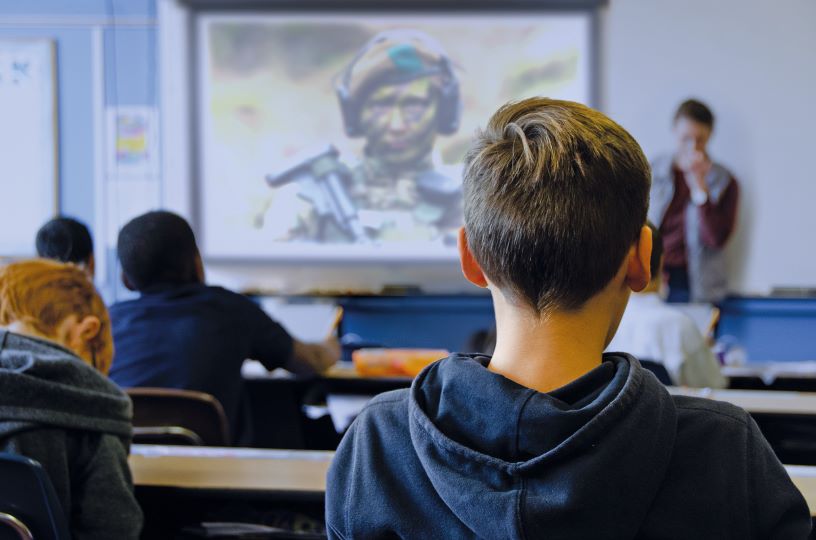Quaker pamphlet to counteract militarisation of British schools
Quakers have produced a resource to help schools offer a balanced perspective after their research found widespread targeting of schoolchildren by the armed forces and arms companies.

Since 2008, there has been a concerted push by the armed forces to engage with school children, especially those in deprived areas, with visits to 10,000 schools a year, freedom of information requests show.
And social media research by Quakers in Britain found that arms manufacturers including BAE Systems and Raytheon MBDA visit a British school for every day of every school term. The impact of their weapons in war is rarely part of presentations.
Legally schools must consider how military engagement affects safety and wellbeing, educational impartiality and freedom of conscience.
[QUOTE-START]
Blurring the lines between the military and civil society may create a culture more accepting of war.
- Isabel Cartwright
[QUOTE-END]
Under UN Sustainable Development Goal 4.7, children should be taught about peace, tolerance and nonviolence.
But significant concerns have been documented, such as the exploitative targeting of children to embed positive ideas about military life and minimise the risks faced by under-18 recruits.
Now Quakers in Britain have produced a pamphlet to help schools engage while still meeting their responsibilities to children.
“Responding to military engagement in schools" is available online in English and Welsh. Copies have been sent to hundreds of schools known to be targeted by the military and arms companies.
“All schools and young people must be given a broad range of views about topics, so as not to be 'indoctrinated' as per the requirements of the Education Act 1996," said Hans Svennevig, subject leader for the Citizenship PGCE at University College London.
“This includes teaching about the military and so if schools have the armed forces to deliver content, they must work to ensure that a range of views are provided."
“Militarised education is a hallmark of less democratic and violent regimes, including Russia," said Isabel Cartwright, peace education manager at Quakers in Britain. “Blurring the lines between the military and civil society may create a culture more accepting of war.
“Quakers don't want to ban all learning about the military, but it needs to be set in an appropriate context without misleading sanitisation."
One trainee teacher said: “I am already aware of the need for not imposing political opinions as a teacher. This can be difficult when you're asked to facilitate sessions that you don't agree with, such as activities by the military in schools.
“This resource helps me to be better equipped to present alternative perspectives and offers resources for children and colleagues to enable future talking points."
The pamphlet includes a checklist for how schools can manage military engagement and a range of resources that provide information for balance and critical thinking.